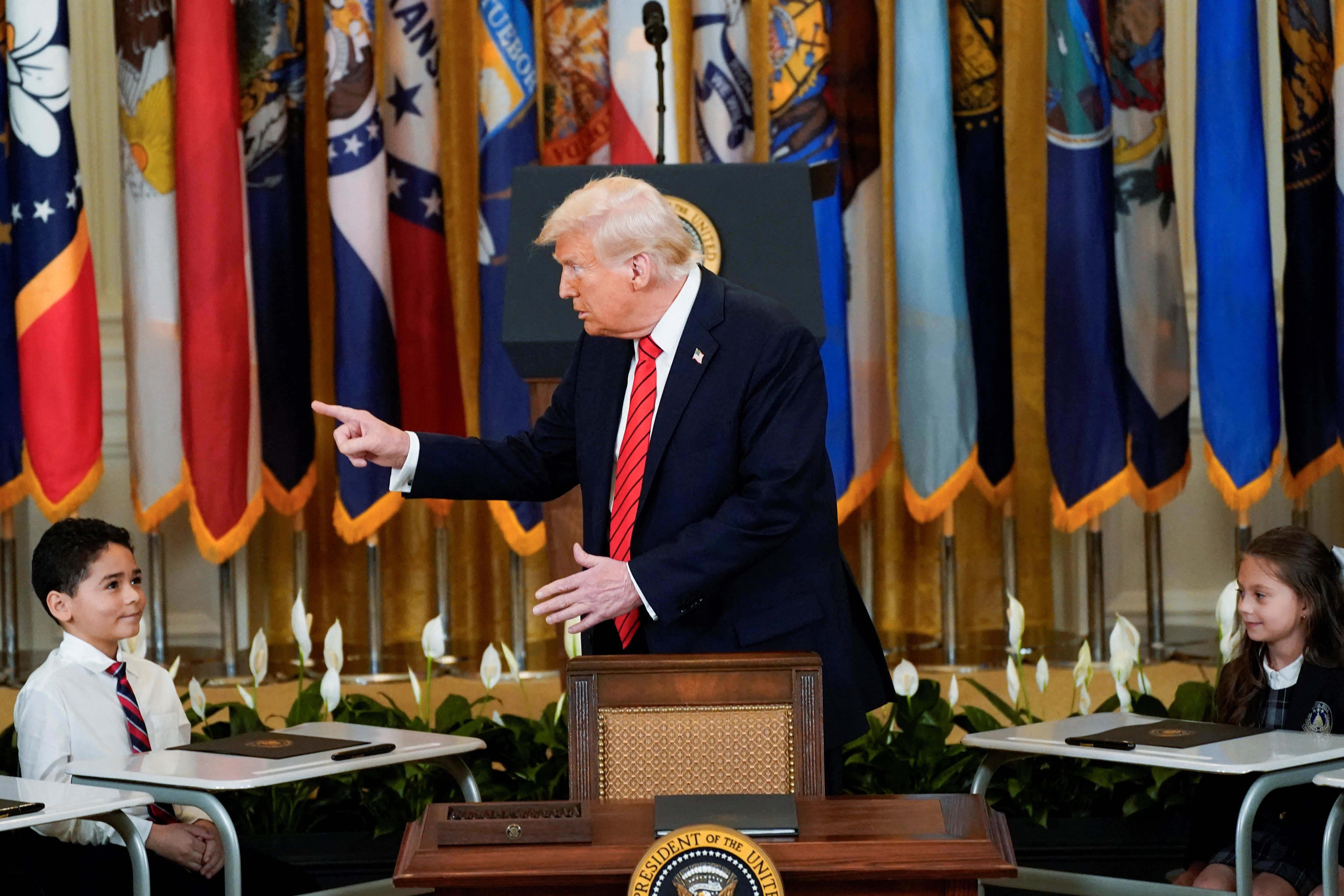“They say that we imprisoned thousands. I say we liberated millions,” said Bukele about his record of jailing people without due process, adding that: “To liberate that many, you have to imprison some.”
“Who gave him that line? You think I could use that?” replied Trump to general merriment.
Bukele has obliged Trump by incarcerating hundreds of Venezuelan and Salvadoran migrants deported from the US on suspicion of being members of criminal gangs – none of whom have had their day in court. One person of particular interest to the journalists was Kilmar Abrego Garcia, a Maryland man deported due to an “administrative error”. The US Supreme Court has ordered the Trump administration to do everything in its power to “facilitate” his return to his wife and family in the US.
“Of course I’m not going to do it,” Bukele said, when asked if he would send Abrego Garcia back to the US, adding that it would be like “sending a terrorist back to the United States”. Smiles all round from the US officials. This apparently makes it a matter of foreign policy rather than a failure of US justice – or, just as crucially, an impending constitutional crisis over the Trump administration’s failure to obey a Supreme Court ruling
Bukele knows a thing or two about circumventing constitutional law, writes Amalendu Misra, a professor of international politics at Lancaster University, who has written extensively about Latin America for The Conversation. The Salvadoran president is serving a second term, despite his country’s constitution previously restricting a president from serving two consecutive terms.
Critics say Bukele used his considerable majority to replace five members of El Salvador’s Supreme Court in order to get the decision he wanted – which may also have raised him in the US president’s estimation.
Misra charts Bukele’s rise to power and his achievements in office, which include transforming El Salvador from the murder capital of the world to having one of the lowest homicide rates in the western hemisphere. But not without considerable infringements of human rights and civil liberties – something to which, as we’ve seen, Bukele unabashedly owns up.
Meanwhile, constitutional scholars are picking apart the US Supreme Court’s ruling in the matter of Abrego Garcia, who is currently sitting in El Salvador’s notorious Center for Terrorism Confinement (Cecot) mega-prison.
What exactly did the court mean when it instructed the Trump administration to “facilitate” his return to the US? The US attorney-general, Pam Bondi, offered her interpretation on Wednesday – saying the decision was completely up to Bukele, and that if he wanted to send Abrego Garcia back, “we would give him a plane ride back”.
Trump’s relationship with US constitutional law is already coming under a fair bit of scrutiny, as he and his senior officials have embarked on a concerted effort to push back against court rulings which seek to reverse or delay some of his policies.
“Trump’s approach seems to be one of testing the limits of the law,” writes Stephen Clear, a constitutional law expert at Bangor University. Clear believes that Trump’s second term is going further, faster, than his first in putting pressure on the system of checks and balances on which the US constitution depends.
Clear looks at Trump’s strategy of using executive orders to make policy – there have been 124 in his first 85 days (executive orders don’t need congressional approval). The federal courts are now examining many of these orders, which have been challenged on the grounds of unconstitutionality. The US Supreme Court is already facing an unprecedented number of emergency applications, and it remains to be seen when the justices will decide – and, crucially, how the administration responds to the Supreme Court’s decisions.
A federal court judge whose ruling regarding the deportation of 100 migrants to El Salvador was apparently disregarded by the Trump administration has released an opinion that this failure to comply constitutes “probable cause” to hold members of the administration in criminal contempt.
US district court judge James Boasberg wrote that a judicial order “must be obeyed – no matter how erroneous it may be – until a court reverses it”. US legal scholar Cassandra Burke Robertson answers our questions about this matter.
In the end, the most reliable test of Trump and the Republican party is still at the ballot box. The mid-term elections, the first real test of the US public’s approval of Trump 2.0, are more than 18 months away. But how is the second Trump administration going down with Americans?
It depends who you ask, writes Paul Whiteley of the University of Essex. Whiteley, an expert scrutineer of public opinion, was interested to see whether the recent upheaval created by Trump’s tariffs plan had affected the way the US public views his performance.
Committed Republicans still tend to give credit to Trump that he knows what he is doing, while Democrats, as you’d expect, remain fundamentally opposed to the administration. And the same goes, broadly speaking, for their respective views on his handling of trade policy. But the big shift, Whiteley observes, is among people identifying as independents, where Trump’s approval rating has fallen considerably, particularly over the tariffs.
This is significant, Whiteley believes, because independents now make up the largest voter group in the US. He concludes: “If this shift continues, and independent voters support Democrat candidates in the 2026 mid-term elections, it means that the Democrats are likely to take control of Congress.”
Jonathan Este, Senior International Affairs Editor, Associate Editor, The Conversation
This article is republished from The Conversation under a Creative Commons license. Read the original article.
